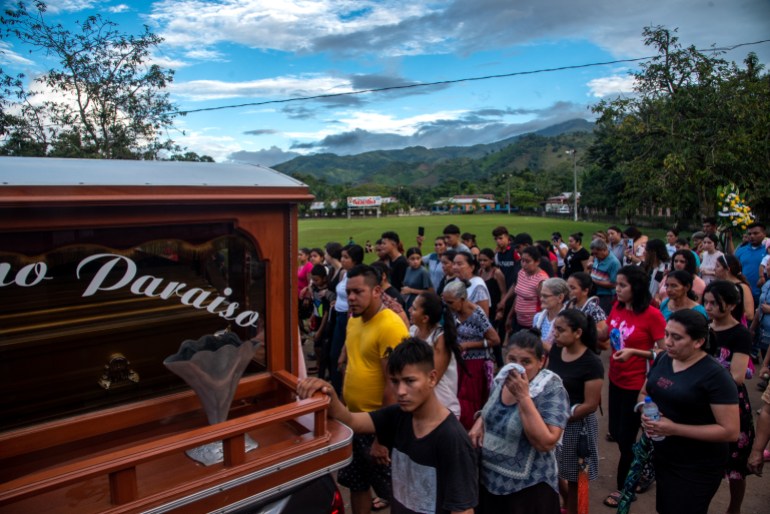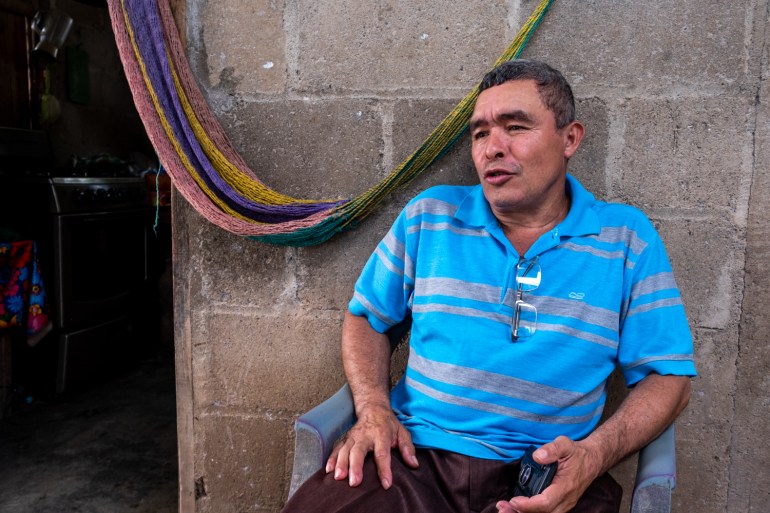Tocoa, Honduras – The killing of two Honduran water defenders this month has sparked international outrage, with the United Nations calling for an investigation and locals questioning the government’s commitment to protecting environmental activists.
Aly Dominguez, 38, and Jairo Bonilla, 28, were members of the Guapinol water defenders movement, organising to protect their rivers from a controversial open-pit iron oxide mining project in Carlos Escaleras National Park. In recent years, several activists have been killed in unclear circumstances amid community opposition to the mine.
The families of Dominguez and Bonilla say they were killed by unidentified gunmen after weeks of threats related to their activism. Reinaldo Dominguez, Aly’s brother, told Al Jazeera that the killing capped off a long process of intimidation.
“We need action here,” he said after the funeral last week, which was attended by hundreds of residents. “The public ministry needs to investigate and put arrest warrants out for the armed groups … They say, ‘We lament this.’ We want action.”
Upon taking office a year ago, Honduran President Xiomara Castro promised to undo more than a decade of corruption since the 2009 coup against her husband, former President Manuel Zelaya.

She promised to end violence against land and water defenders, who have been targeted by hit squads linked to corrupt business interests and state security forces. For years, Honduras has been one of the most dangerous places in the world for environmental activists.
Among Castro’s first moves as president was freeing a group of imprisoned Guapinol activists in February 2022. Soon afterwards, her government declared the country “free of open pit mining” and said it would cancel mining permits, though activists say there have been no cancellations since then.
In a statement, the Honduran human rights secretariat condemned the killing of Dominguez and Bonilla and called for a transparent investigation. Representatives for the Castro government either declined Al Jazeera’s requests for comment or did not respond to inquiries.
Meanwhile, activists are questioning the state’s commitment to Castro’s lofty promises.
“I can’t believe everything Castro says,” Daniel Marquez, one of the Guapinol environmentalists released last February, told Al Jazeera in an interview last summer. “She said we were going to leave prison, and we did. But she also said she was going to eliminate the mining concessions … [The government] hasn’t done what it promised.”
Threats and violence
Honduran police have said that Dominguez and Bonilla died in a robbery gone wrong, but family members say their motorcycles and personal belongings were not taken. A UN special rapporteur last week called for an independent probe of their deaths, “which must take into account the possibility that they have been retaliated against for their work defending human rights”.
The mining company they resisted, Inversiones Los Pinares, is co-owned by Lenir Perez, one of the most powerful business magnates in the country.
Pinares, which did not respond to Al Jazeera’s requests for comment, has long argued that it practices “environmentally responsible” mining, bringing jobs and development to an impoverished region. Perez has said in the past that opposition to the iron oxide mine was being driven by left-wing groups financed by actors from outside the region.

Meanwhile, land and water defenders continue to face threats and violence in Honduras.
In December, activist Mauricio Esquivel, a member of a local farm cooperative that had been occupying a corporate palm plantation, was found dead in the village of Quebrada de Arena, just kilometres from where Dominguez and Bonilla were killed, residents told Al Jazeera.
Esquivel’s killing came after months of threats by a local armed group, according to members of the cooperative who spoke with Al Jazeera. Some said they still had faith in the Castro government but maintained a deep distrust towards police and military forces.
“We can’t go out of the cooperative because of fear that we’ll be killed,” one member told Al Jazeera on condition of anonymity.
Earlier in December, an Indigenous Lenca leader, Nery Gonzalez, was the victim of an apparent assassination attempt, suffering a bullet wound to the head after organising his community against displacement by wealthy landowners. And in November, police and military forces evicted members of the Afro-Honduran Garifuna community from their ancestral village of Punta Gorda.
According to Esly Banegas, an activist in Tocoa, many areas of land and water across Honduras are under threat from corrupt business interests, and a unified struggle is needed.
“This is about human rights. All life is at risk in Honduras,” Banegas told Al Jazeera. “We’re facing a monster that looks to destroy all of the defences, so that no one opposes these death projects that they’re bringing.”


